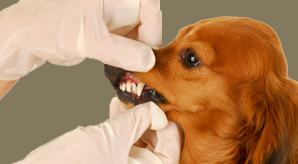

Your pet's oral condition can absolutely influence (and be an indicator of) their overall health. Pets that have poor oral condition may:
Periodontal disease is the most common dental condition affecting dogs and cats. According to the American Veterinary Dental Society, more than 80 percent of dogs and 70 percent of cats develop gum disease by the age of three. Infection and inflammation of the gums, ligaments, and bone supporting the teeth are caused by bacteria present in plaque and calculus (tartar) and needs to be prevented (via prophylaxis) or treated (via periodontal treatment). Advanced periodontal disease may cause loss of teeth, pain, and may contribute to complications and severity of systemic diseases.
Periodontal disease is a progressive disease. It is a serious matter, and should be evaluated and treated.
When your pet's mouth consistently smells bad, it often is due to accumulation of plaque and calculus. The metabolic activity of the bacteria that form plaque in the mouth causes an inflammation reaction. In this situation, your pet should have a professional dental cleaning, followed by daily home dental care, to alleviate the smell and improve their health and comfort.
If your pet fractures a tooth, you should bring him or her in for a dental evaluation. Even if your pet is acting normal, an extraction or root canal therapy may be necessary to avoid infection.
Root canal therapy often can be an alternative to the extraction of a fractured and/or an infected tooth. During root canal therapy, the infected nerves and blood vessels within the tooth (this is called pulp) are removed. After cleaning the infection out of the tooth (disinfection/sterilization), the area is filled with a material that does not support bacterial growth. A filling or a crown is placed to restore normal function of the tooth.
Overbites and underbites are types of malocclusion. These can be painful conditions for a pet. They can cause pressure in areas of the mouth, leading to sores and wounds, may cause issues eating, and can even lead to periodontal disease. Most malocclusions are hereditary, meaning your pet may propagate these defects to its offspring. We recommend spaying or neutering pets with malocclusions. If your pet has an over/under shot jaw, you should make an appointment for an orthodontic evaluation.